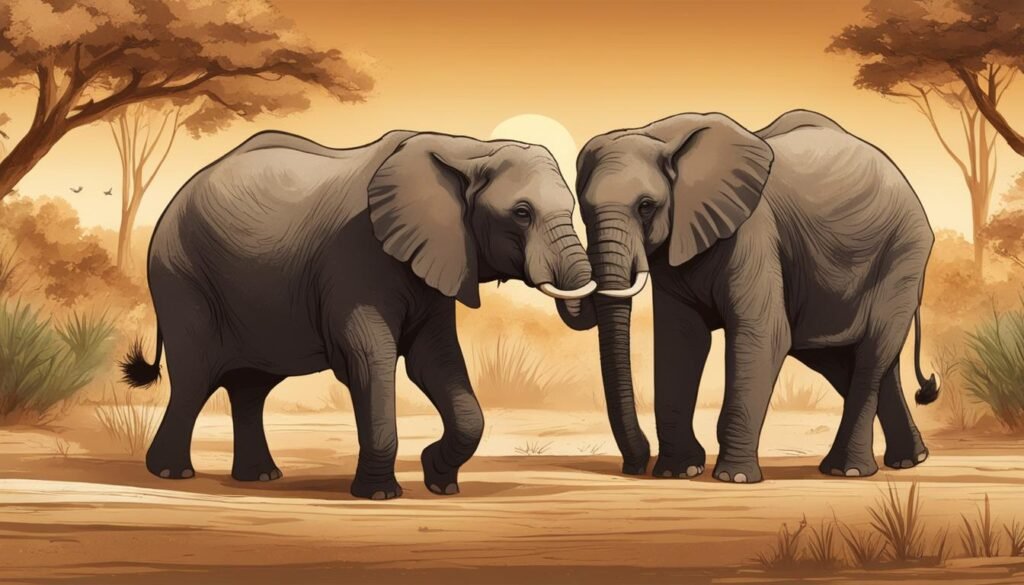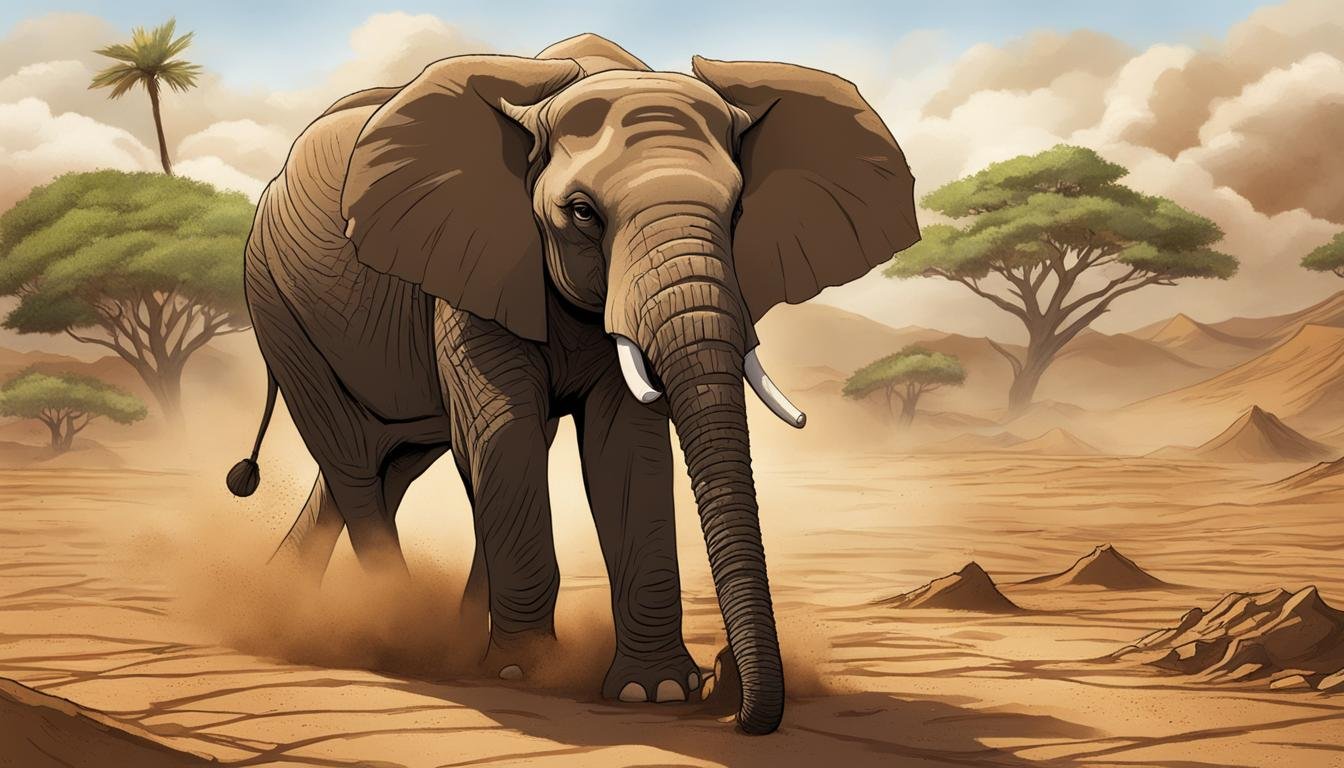Welcome to our fascinating exploration of elephant behavior! Have you ever wondered why elephants, those majestic creatures, engage in the peculiar behavior of throwing dirt on themselves? Join us as we delve into the world of dusty elephants and uncover the secrets behind their self-dusting behavior.
Elephants, known for their intelligence and complex social structures, exhibit a range of self-care behaviors that contribute to their overall well-being. Among these behaviors, throwing dirt on their bodies holds a significant place. Let’s uncover the reasons behind this intriguing elephant ritual.
Key Takeaways:
- Elephants throw dirt on themselves as a form of self-care and body maintenance.
- This behavior serves multiple purposes, including sun protection, bug/insect bite prevention, and hygiene maintenance.
- Throwing dirt on their bodies helps elephants exfoliate and keeps their skin clean and healthy.
- It also serves as a stress relief mechanism and aids in conflict resolution within elephant social groups.
- Communal dusting, where elephants engage in this behavior as a group, strengthens bonds and social interactions.
Sun Protection
One of the reasons why elephants throw dirt on themselves is to protect their skin from the sun’s harmful UV rays. Unlike most mammals, elephants do not have hair or fur to protect their skin. By throwing dirt on their bodies, they create a protective layer that acts as a natural sunscreen.
This self-dusting behavior is especially important for elephants living in hotter climates where they are exposed to intense sunlight for long periods. The layer of dirt on their skin helps to shield them from the sun’s UV rays, preventing sunburn and potential damage to their sensitive skin.
Elephants are known to have a high risk of skin cancer due to prolonged exposure to the sun. The dirt acts as a physical barrier, blocking out a significant portion of the harmful UV radiation. This natural sun protection method is an essential aspect of elephant self-care and helps them maintain healthy skin.
Bug/Insect Bite Protection
Aside from sun protection, another reason why elephants engage in self-dusting behavior is to protect themselves from bugs, parasites, and insect bites. These pesky critters can cause discomfort and irritation to elephants, and by throwing dirt on their bodies, elephants create a barrier that suffocates the bugs and makes it harder for them to bite the elephants’ skin.
Elephants have sensitive skin, and insect bites can lead to itching and potential infections. By utilizing their self-dusting technique, elephants can defend themselves against these bothersome bugs. The dirt acts as a natural repellent, preventing insects from landing on their skin and reducing the risk of bites and infestations. It’s a clever strategy that elephants have developed through their evolution to protect themselves against these tiny but annoying creatures.
While elephants can use their trunks to ward off insects in the immediate vicinity, throwing dirt on their bodies provides a more comprehensive form of bug protection. The particles in the dirt create a physical barrier that not only suffocates the bugs but also serves as a deterrent for future encounters. By engaging in this behavior, elephants can minimize the chances of being bitten and maintain their comfort and well-being in their natural habitat.
Hygiene and Skin Exfoliation
Contrary to what may seem ironic, elephants actually clean themselves by throwing dust on their bodies. The particles in the dirt act as an exfoliant, helping the elephants shed off dead skin cells and accumulated dirt. This self-dusting behavior helps elephants maintain hygiene and keep their skin clean and healthy.
Similar to how humans use scrubs or brushes to exfoliate their skin, elephants utilize the abrasive nature of dust to remove impurities. The rough texture of the dirt particles not only helps to slough off dead skin cells but also removes any insects or debris that may have gotten stuck on their bodies.
This natural exfoliation process ensures that elephants have clear pores and healthy skin. By removing the dead skin cells and dirt, the elephants’ skin can breathe better and maintain its natural pH balance. It also helps to prevent skin conditions or irritations that may occur due to the build-up of grime or bacterial growth.
Stress Relief and Conflict Resolution
Elephants are highly intelligent and social animals, and like humans, they can experience stress and conflicts within their groups. However, elephants have their unique ways of dealing with these situations. One such behavior is the act of throwing dirt on themselves, which serves as a form of stress relief and conflict resolution.
When tensions rise within the group, elephants will often engage in self-dusting behavior to divert their attention from the conflict. As they throw dirt on their bodies, they instinctively clear their eyes, creating a distraction that helps to diffuse the tension. By focusing on this self-grooming activity, elephants can calm themselves and reduce the risk of physical altercations.
This stress-relieving behavior also acts as a communication tool among elephants. It signals to other members of the group that the elephant wishes to avoid confrontation and resolve conflicts peacefully. By observing this behavior, other elephants understand that it’s a time for de-escalation and finding a more harmonious resolution.
The Power of Bonding
Elephants are known for their strong social bonds, and the act of throwing dirt on themselves also plays a role in strengthening these relationships. When elephants engage in communal dusting, they not only groom themselves but also create a shared experience among members of the same clan. This behavior fosters a sense of unity, trust, and bonding, particularly between mothers and their calves.
“The act of communal dusting allows elephants to connect on a deeper level, reinforcing their social ties and promoting a sense of belonging within the group.” – Elephant Behavior Expert
Through the behavior of throwing dirt on themselves, elephants demonstrate their remarkable ability to navigate social dynamics and maintain harmony within their communities.

Socialization and Group Behavior
In addition to bonding, communal dusting also facilitates socialization and group behavior among elephants. Through this shared activity, elephants learn from each other, share information, and develop a sense of cooperation within their communities. In a way, communal dusting can be seen as a form of group grooming, where social connections are strengthened through the collective care and well-being of each member.
Communal dusting plays a crucial role in reinforcing the social fabric of elephant groups. It fosters a sense of unity, cooperation, and trust among individuals, ultimately contributing to the overall cohesion and stability of the group.
Overall, the act of communal dusting is not merely a physical behavior for elephants, but rather a deeply ingrained social ritual that promotes bonding, socialization, and the maintenance of harmonious group dynamics.
Conclusion
The fascinating behavior of elephants throwing dirt on themselves serves as a testament to their unique self-care behaviors. Through dust bathing and dirt throwing, elephants engage in a range of activities that contribute to their overall well-being and maintenance.
Elephants utilize this behavior for multiple purposes. Firstly, by coating their bodies with dirt, they create a protective layer that shields them from the sun’s harmful UV rays. Additionally, throwing dirt on themselves acts as a natural bug repellent, safeguarding them against insect bites and parasites.
Interestingly, this self-dusting behavior also plays a role in their hygiene routine. The particles in the dirt aid in exfoliating their skin, removing dead cells and accumulated dirt, and promoting cleanliness.
Furthermore, throwing dirt on themselves serves as a means of stress relief and conflict resolution for elephants. By diverting their attention and focusing on clearing their eyes, they can diffuse tension within their social groups.
Overall, the act of throwing dirt on themselves is a complex behavior that encompasses various aspects of elephant behavior. From self-care and hygiene maintenance to stress relief and social bonding, these incredible animals display their remarkable adaptability and ingenuity through their self-dusting behaviors.
FAQ
Why do elephants throw dirt on themselves?
Elephants throw dirt on themselves for various reasons, including sun protection, bug/insect bite protection, hygiene and skin exfoliation, stress relief and conflict resolution, and bonding and social interaction.
How does throwing dirt protect elephants from the sun?
Elephants do not have hair or fur to protect their skin, so by throwing dirt on their bodies, they create a natural sunscreen that helps shield their skin from harmful UV rays.
What is the purpose of self-dusting behavior for elephants?
Self-dusting helps protect elephants from bugs, parasites, and insect bites by creating a barrier that suffocates the pests and makes it harder for them to bite the elephants’ skin.
How does throwing dirt help with elephant hygiene?
The dirt particles act as an exfoliant, helping elephants shed dead skin cells and accumulated dirt. This self-dusting behavior contributes to maintaining hygiene and keeping their skin clean and healthy.
Why do elephants throw dirt on themselves during conflicts?
When elephants want to diffuse tension or avoid fights, they engage in self-dusting behavior as a way to distract feuding members. By focusing on clearing their eyes, their attention is diverted from the conflict, allowing tempers to cool down.
Is self-dusting a communal behavior among elephants?
Yes, self-dusting is a form of communal dusting, where elephants within the same clan will also engage in this behavior. It helps build strong bonds and connections between members, especially between mothers and their calves.
What are the main benefits of throwing dirt on themselves for elephants?
The self-dusting behavior of elephants serves multiple purposes, including sun protection, bug/insect bite protection, hygiene maintenance, stress relief, and social bonding.

